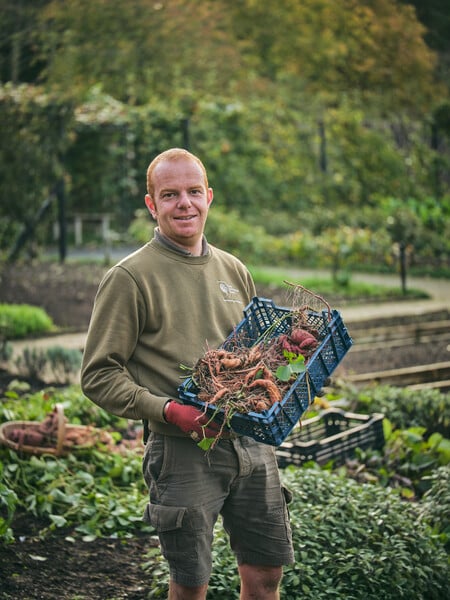
Surely there isn’t anything quite as British than watching the seasons change throughout the year, especially here in Devon where we are surrounded by beautiful countryside and far reaching oceans that lay on a never ending change of display throughout the year.
But there is more to these seasons than just crisp autumn leaves, the snow-topped tors of wintery Dartmoor, daffodils in hedge banks in spring and of course ice cream on the beach in summer. The change of seasons also brings with it a change of fresh local fruit and vegetables to our plates, and celebrating this is one of the greatest things that we can do for locally grown produce.
Consumers over the past few decades have become more and more disconnected with where their food comes from and when it’s in season; asparagus in November, tomatoes in February and even Brussel sprouts on the hottest day of the year have all become the norm due to modern supermarkets reaching out into the far reaches of the world to import these foods just to keep the consumer happy. Global seasonality has become the everyday, when somewhere on the planet that particular crop is in season, and can be flown in, rather than local seasonality which follows a very distinct pattern through the year.
Finally, people are starting to wake up to the realisation that there is more to the food they eat than just the convenience of popping to the supermarket, where the shelves of fruit and veg have remained looking the same all year round due to this so called global seasonality.
There are four very distinct seasons that bring huge diversity to our plates, whilst enjoying the natural cycle throughout the year. These changing seasons help bring fresh new looks to menus, as chefs and producers work together, following the natural rhythm of the year and the bounty it brings.
The seasons have to be one of the key drivers of the enjoyment of my roles here at RHS Garden Rosemoor here in stunning North Devon. As the Edibles Team Leader I oversee the growing of all the edible crops. Working outdoors all year round you get a real feel for the movement of the seasons and the joy they bring, seeing a huge selection of crops come and go throughout the year.
For me, supplying seasonal crops to our onsite kitchen makes it all worthwhile. Working closely with our head chef, I am able to help them celebrate everything the garden has to offer in their menus. Seeing our visitors enjoy all the crops we have grown and supplied fresh straight from the garden and in to our restaurant, really drives home how important that close working relationship between grower, producer or chef and end customer is really is.
Enjoying seasonality also brings many other benefits, not only is it good for the planet, removing air miles by using British grown produce and reducing the needs for huge commercial glasshouse, burning fossil fuels in winter to keep them warm so enjoy just so we can enjoy salads all year round. It also helps support the local economy, and small scale producers that put great passion into growing their produce, something that always shines through on the finished dish. However the biggest benefit has to be that it’s fresh, tasty, and nutritious it hasn’t lost all its goodness in transport.
As we head into the autumn, now is a great time to start celebrating everything that’s in season, the big harvest begins, and as a gardener here at RHS Garden Rosemoor this is one of my favourite times of the year, all our hard work throughout the year really starts to pay off. Squashes and pumpkins are at their very best, and what is more saying of the autumn season, the late summer sun has helped ripen them, bringing sweetness and depth of flavour. The apple and pear harvest in full flow, as a nation we grow hundreds of different apple and pear varieties, all bringing unique delicate flavours and characteristics often lost in mass imported varieties imported from abroad, where they can spend many months in cold store loosing much of their nutritional value. Often overlooked Florence fennel comes into its own, alongside later season salad crops and many brassica crops including cauliflowers and broccoli, and the brightly coloured stems of Swiss chard cannot be missed.
As we move into winter the real hearty veg harvest comes into its own, Brussels sprouts, kale, celeriac, parsnips, swedes and leeks all come to the fore front with purple sprouting broccoli bring up the end of the winter season, many benefiting from a good hard winter frost that that turn the stored starches into sugars. It’s also a good opportunity to use stored vegetables like onions, shallots and even butternut squash.
Soon we find ourselves in early spring, March can often be referred to the hungry gap, where we have used up most of our winter vegetables but the early sown crops are far from being ready, this can prove challenging for those following the seasons. A little fore planning in the autumn can help fill this gap, making the most of unheated glasshouses and polytunnels, crops such as chard, beetroot and spinach, along with oriental mustards and pakchoi can be sown in October and November, they steadily over winter, and as it begins to warm in late February and early March, they burst back into full growth helping to fill the dreaded “Hungry Gap”. It’s not long though till the spring season kicks back in properly, spinach, spring greens, kohl rabi, beetroot and sorrel become ready for harvest quickly followed broad beans, peas and asparagus as we start to transition from late spring into early summer.
Finally we reach party time of seasonality, summer is here and it’s all go go go. We hit June, and this is the traditional British strawberry season, and there is nothing quite the same as sweet juicy British grown strawberry. New potatoes, French beans, runner beans, are joined by courgettes, cucumbers, lettuce and other salad leaves. Autumn planted garlic is ready for harvest, and soon spring planted onions and shallots will be ready for lifting, they can be used fresh but are always a good one to dry in the summer sun for use throughout the year. The warming weather continues and begins to ripen tomatoes, aubergine and sweet peppers. Soft fruits soon take centre stage, gooseberries, blackcurrants, redcurrants and blueberries all shouting out for attention, which are followed blackberries in late summer and not forgetting sweetcorn, which hits its peak in late august, and early September, there is nothing quite the same as fresh sweetcorn, that has gone from plot to plate in the shortest possible time, preventing the natural sugars from reverting back into starches.
Eating with the seasons has so much to offer, and perhaps now is the time to explore what this country has to offer in great home grown produce, from small independent growers.



